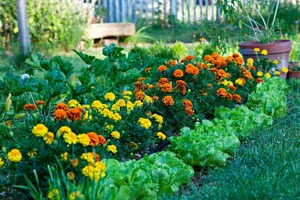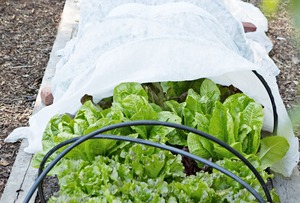Growing your own vegetables is one of the most rewarding ways to enjoy fresh, healthy produce. However, one of the biggest challenges that come with gardening is keeping pests away. While chemical pesticides can be effective, they often come with risks to the environment, beneficial insects, and even your health. Fortunately, there are several natural, non-toxic methods that can help you repel pests from your vegetable garden without the need for harmful chemicals. In this article, we’ll explore 8 easy, chemical-free ways to keep pests at bay and maintain a thriving vegetable garden.
1. Companion Planting

Companion planting involves growing specific plants together to improve growth and deter pests. Certain plants naturally repel insects by emitting strong scents or attracting beneficial predators that feed on harmful bugs. By strategically pairing plants, you can create a natural pest control system for your garden.
Examples of Effective Companion Plants:
- Marigolds: These bright, beautiful flowers repel aphids, whiteflies, and nematodes. Plant them around vegetables like tomatoes, peppers, and cucumbers.
- Basil: Basil repels mosquitoes, aphids, and whiteflies, making it a great companion for tomatoes and peppers.
- Lavender: The strong scent of lavender repels moths, fleas, and flies, which can benefit nearby vegetables.
Companion planting not only helps deter pests but can also boost plant growth and improve vegetable yields.
2. Attracting Beneficial Insects

Not all insects in your garden are harmful—some, like ladybugs and lacewings, are natural predators of pests like aphids, mites, and caterpillars. Encouraging these beneficial insects can help create a balanced ecosystem in your garden, where pests are naturally controlled.
How to Attract Beneficial Insects:
- Plant Flowers: Flowers like daisies, yarrow, and fennel are excellent for attracting predatory insects.
- Provide Water: A small water source, such as a shallow dish with rocks for perching, can draw beneficial insects to your garden.
- Avoid Pesticides: Even organic or natural pesticides can harm beneficial insects, so avoid using them if you want to encourage natural pest control.
By cultivating an environment where helpful insects thrive, you’ll reduce pest populations without resorting to chemical solutions.
3. Use Row Covers

Row covers are lightweight fabrics that protect your vegetable plants from pests by physically blocking them from reaching your crops. These covers allow light, air, and water to penetrate while preventing insects like aphids, cabbage worms, and beetles from landing on your plants.
How to Use Row Covers:
- Cover newly planted vegetables to protect them from pests during the vulnerable early stages.
- Secure the edges of the cover to the ground to prevent insects from sneaking underneath.
- Use row covers until the plants start flowering, then remove them to allow pollination.
Row covers are especially useful for leafy greens and root vegetables that are susceptible to pests, such as spinach, kale, and carrots.
4. Use Natural Barriers
Creating physical barriers around your garden can be an effective way to deter crawling pests like slugs, snails, and caterpillars. These barriers can be made from materials that pests find difficult to cross.
Effective Natural Barriers:
- Diatomaceous Earth: This powdery substance, made from crushed fossilized algae, is sharp and abrasive to crawling pests like slugs and snails. Sprinkle it around the base of your plants to create a barrier.
- Crushed Eggshells: Crushed eggshells work similarly to diatomaceous earth, creating a rough surface that pests dislike crossing.
- Copper Tape: Copper emits a small electric charge when it comes into contact with slug or snail slime, effectively deterring them from climbing over it.
By placing these natural barriers around your garden beds or individual plants, you can prevent pests from reaching your vegetables without using chemicals.
5. Homemade Natural Sprays
There are many natural ingredients you can use to make DIY pest sprays that are safe for your garden. These sprays can repel a variety of insects and are easy to make with ingredients you likely already have in your kitchen.
Common Homemade Pest Sprays:
- Garlic Spray: Garlic’s strong smell repels many insects, including aphids, beetles, and whiteflies. To make garlic spray, blend a few cloves of garlic with water, strain the mixture, and spray it directly onto your plants.
- Soap Spray: A simple solution of water and mild dish soap can help repel soft-bodied insects like aphids, mites, and thrips. Spray the mixture on affected plants, but avoid using it on hot, sunny days to prevent leaf burn.
- Chili Pepper Spray: Spicy chili pepper spray can deter a variety of pests, including aphids and caterpillars. Mix a tablespoon of chili powder with water, add a drop of dish soap, and spray it on your plants.
These homemade sprays are not only effective but are also eco-friendly and non-toxic to your garden.
6. Mulching
Mulching is a simple yet effective way to repel pests and protect your garden. By covering the soil around your plants with organic materials like straw, wood chips, or leaves, you create a physical barrier that discourages pests from laying eggs or feeding on your vegetables.
Benefits of Mulching:
- Prevents Soil-Borne Pests: Mulch blocks pests like fungus gnats and flea beetles from emerging from the soil.
- Improves Soil Health: Mulch helps retain moisture, regulate soil temperature, and improve soil structure, creating healthier plants that are more resistant to pests.
- Discourages Weeds: By reducing weed growth, mulch minimizes competition for nutrients, allowing your vegetables to thrive.
Mulching is an excellent way to naturally deter pests while promoting healthier plant growth.
7. Crop Rotation
Crop rotation is a traditional gardening practice that involves changing the location of crops each season to disrupt the life cycles of pests. Many pests overwinter in the soil and target the same crops year after year, so rotating plants can prevent pests from finding their preferred host.
How to Practice Crop Rotation:
- Divide your garden into sections and rotate plants from different families (such as legumes, brassicas, and nightshades) each year.
- Avoid planting crops from the same family in the same spot for consecutive years, as this allows pests to build up in the soil.
- Keep a garden journal to track your plant placements and rotations.
By rotating crops, you’ll reduce pest populations naturally while also improving soil fertility and reducing disease.
8. Keep Your Garden Clean
A tidy garden is less attractive to pests, as cluttered areas can harbor insect eggs, larvae, and fungal spores. Regularly cleaning and maintaining your garden will help reduce pest problems and create a healthier environment for your vegetables to grow.
Tips for Maintaining a Clean Garden:
- Remove Dead Plant Matter: Decaying leaves, stems, and fruits can attract pests and provide breeding grounds for insects and fungi. Remove dead plant matter regularly.
- Weed Control: Weeds compete with vegetables for nutrients and water, and they can also harbor pests. Keep your garden weed-free by pulling weeds by hand or using mulch to prevent them from sprouting.
- Prune Regularly: Pruning damaged or diseased plant parts can help stop the spread of pests and allow your plants to grow stronger and healthier.
A clean garden is a simple yet effective way to prevent pest infestations without using harmful chemicals.